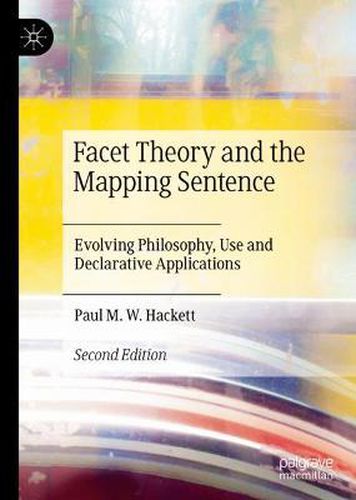Readings Newsletter
Become a Readings Member to make your shopping experience even easier.
Sign in or sign up for free!
You’re not far away from qualifying for FREE standard shipping within Australia
You’ve qualified for FREE standard shipping within Australia
The cart is loading…






This title is printed to order. This book may have been self-published. If so, we cannot guarantee the quality of the content. In the main most books will have gone through the editing process however some may not. We therefore suggest that you be aware of this before ordering this book. If in doubt check either the author or publisher’s details as we are unable to accept any returns unless they are faulty. Please contact us if you have any questions.
This book is the second edition of Facet Theory and the Mapping Sentence: Evolving Philosophy, Use and Application (2014). It consolidates the qualitative and quantitative research positions of facet theory and delves deeper into their qualitative application in psychology, social and the behavioural sciences and in the humanities. In their traditional quantitative guise, facet theory and its mapping sentence incorporate multi-dimensional statistics. They are also a way of thinking systematically and thoroughly about the world.
The book is particularly concerned with the development of the declarative mapping sentence as a tool and an approach to qualitative research. The evolution of the facet theory approach is presented along with many examples of its use in a wide variety of research domains. Since the first edition, the major advance in facet theory has been the formalization of the use of the declarative mapping sentence and this is given a prominent position in the new edition. The book will be compelling reading for students at all levels and for academics and research professionals from the humanities, social sciences and behavioural sciences.
$9.00 standard shipping within Australia
FREE standard shipping within Australia for orders over $100.00
Express & International shipping calculated at checkout
Stock availability can be subject to change without notice. We recommend calling the shop or contacting our online team to check availability of low stock items. Please see our Shopping Online page for more details.
This title is printed to order. This book may have been self-published. If so, we cannot guarantee the quality of the content. In the main most books will have gone through the editing process however some may not. We therefore suggest that you be aware of this before ordering this book. If in doubt check either the author or publisher’s details as we are unable to accept any returns unless they are faulty. Please contact us if you have any questions.
This book is the second edition of Facet Theory and the Mapping Sentence: Evolving Philosophy, Use and Application (2014). It consolidates the qualitative and quantitative research positions of facet theory and delves deeper into their qualitative application in psychology, social and the behavioural sciences and in the humanities. In their traditional quantitative guise, facet theory and its mapping sentence incorporate multi-dimensional statistics. They are also a way of thinking systematically and thoroughly about the world.
The book is particularly concerned with the development of the declarative mapping sentence as a tool and an approach to qualitative research. The evolution of the facet theory approach is presented along with many examples of its use in a wide variety of research domains. Since the first edition, the major advance in facet theory has been the formalization of the use of the declarative mapping sentence and this is given a prominent position in the new edition. The book will be compelling reading for students at all levels and for academics and research professionals from the humanities, social sciences and behavioural sciences.